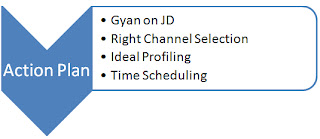The beauty of this summer was the internship and its gyan exploration. Knowledge grows with sharing, right? And It’s a long one.
My assignment was on ‘Recruitment
– Selecting profiles and Scheduling for interviews’ and to close ‘X’ number of
openings. So, the mission starts with the objective
to close the openings in ‘Z’ week(s) timeframe.
First action was to devise the
plan, How? I need to choose the right
channel, ideal profiling , categorization based on profiles, time scheduling,
and gyan (knowledge) on the JD (Job Description) of openings.
Gyan on JD
First of all be acquainted for whom and which position(s)
the recruitment is done. Foundation on the roles & responsibilities,
benefits entitled, etc through the JD.
Channel Selection
Choosing a channel depends on the job position (opening),
the employer’s brand, the resources, the recruiting budget, urgency to close
the opening or the time window, manpower forecast, etc.
So, one can choose from a huge pile of options; say
- Ø Internal advertising – Posting on intranet via online notices, mails to employees(Buddy referral)
- Ø Printed advertising – Posting on local/national/employment special newspapers, newsletters etc
- Ø Online – Using job portals, social – media (as LinkedIn or twitter)
- Ø Consultancy
- Ø Head hunting and /or Poaching
- Ø Re-hire
- Ø Campus recruiting
- Ø Walk-in
- Ø Body Shopping
- Ø Promotions and Present temporary workforce
- Ø Casual applicants
- Ø Candidate references i.e. taking references from the candidates, etc…
Profile Selection and
Ideal Profiling
The profiles are selected based on the JD i.e. role and
responsibilities, age, benchmarking the current/previous working companies, pay
scale, preferred work location, etc… Recruiters practicing the same and using
job portals might notice a strange phenomenon that not all profiles available
on the website are job-seekers. Many candidates upload the resume just to check
their own market demand and stay updated (assumption- by getting recruiter’s
call). Also, some resumes are inactive for a period; still they make appearance
on search; which can be filtered out.
Again, before jumping to the assignment a recruiter need to
do groundwork on Ideal Profiling i.e. identifying the common employee profile
based on psychological parameters that incline to succeed in definite role.
Time Scheduling
It is the most important, yet at times neglected section. A
recruitment process can be breakdown into 1-5 stages depending upon the
employer’s style of recruitment drive and channel. It may consist of an initial
written knowledge test followed by interviews, discussions or combination. The
efficiency of the recruitment based on time taken to conduct each stage is
necessary; it will help the recruiter to amplify the process. It also has dependence on the decision making
ladder. The more complex and lengthy the ladder, the slower the decision, thus
long time taken to close the opening(s).
Also, the time taken to complete the entire process starting
from the first round till the result announcement impacts the employer’s brand.
Even though for a greenhorn initially it seems as easy as
cakewalk, but its demanding. But the above four points of homework makes it enjoyable.
It may seem story of recruitment - selecting 10 profiles from job portal, 8
interested to attend, 4 – 5 arrived for the drive and 2 candidates are offered
the position, ending up as 1 new hire. But selecting the right channels, ideal
profiling and scheduling makes it easier.
What do you think on the same?

